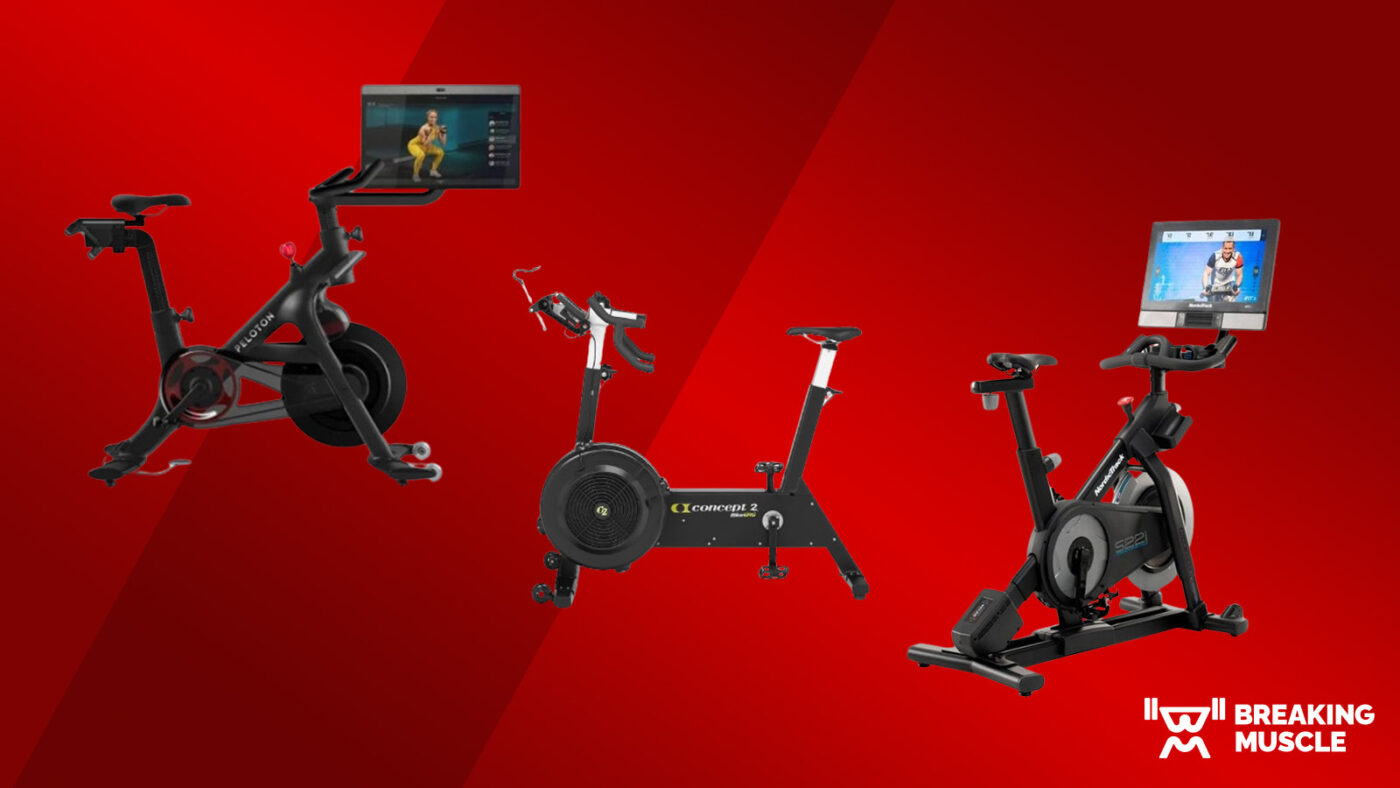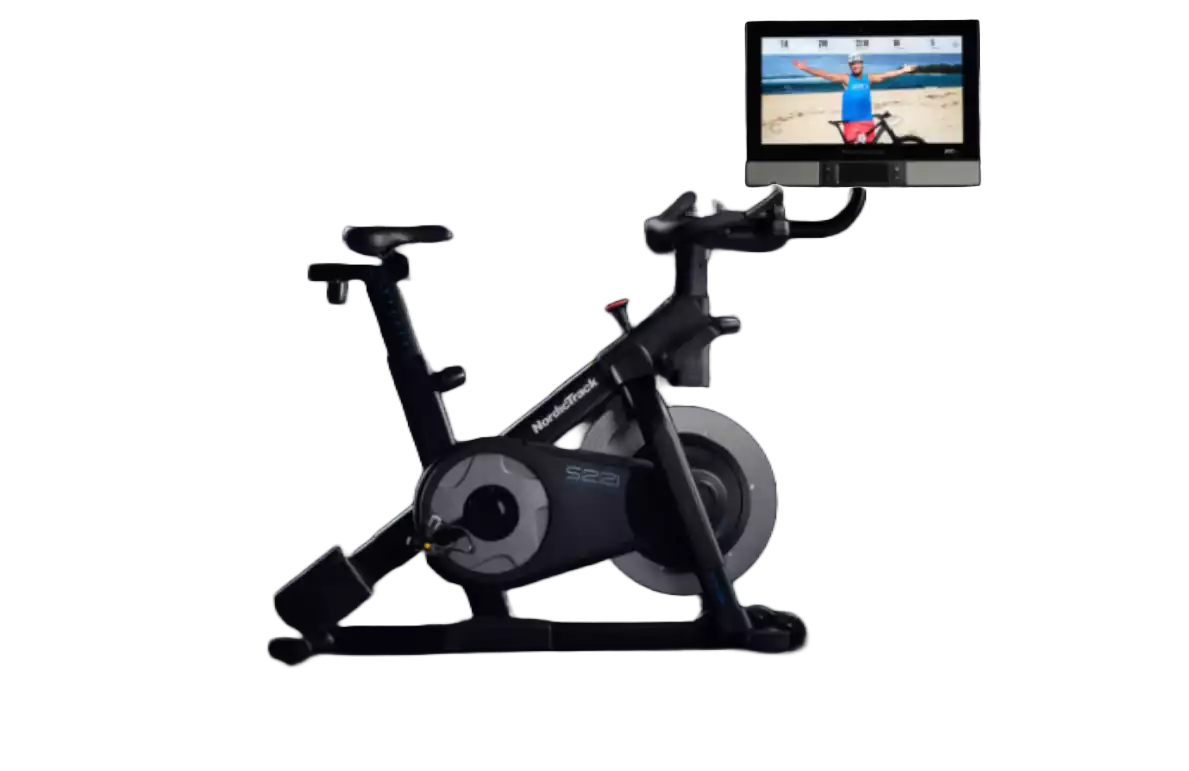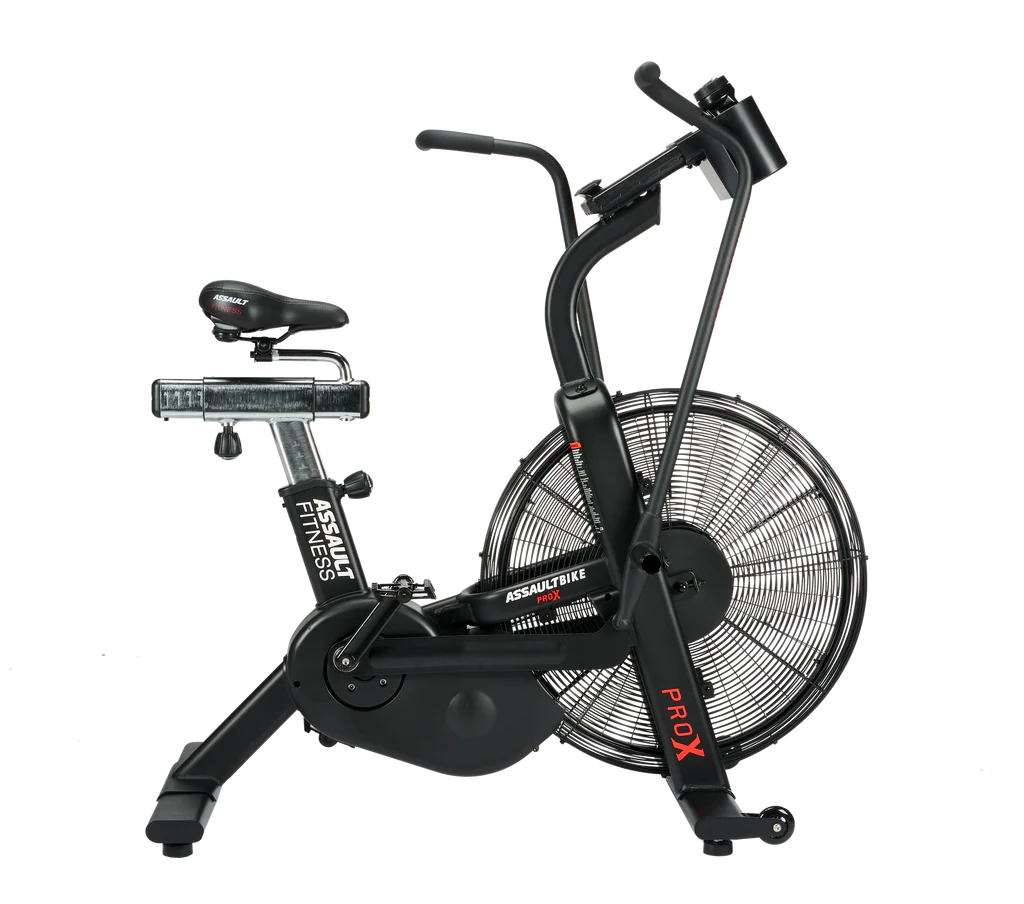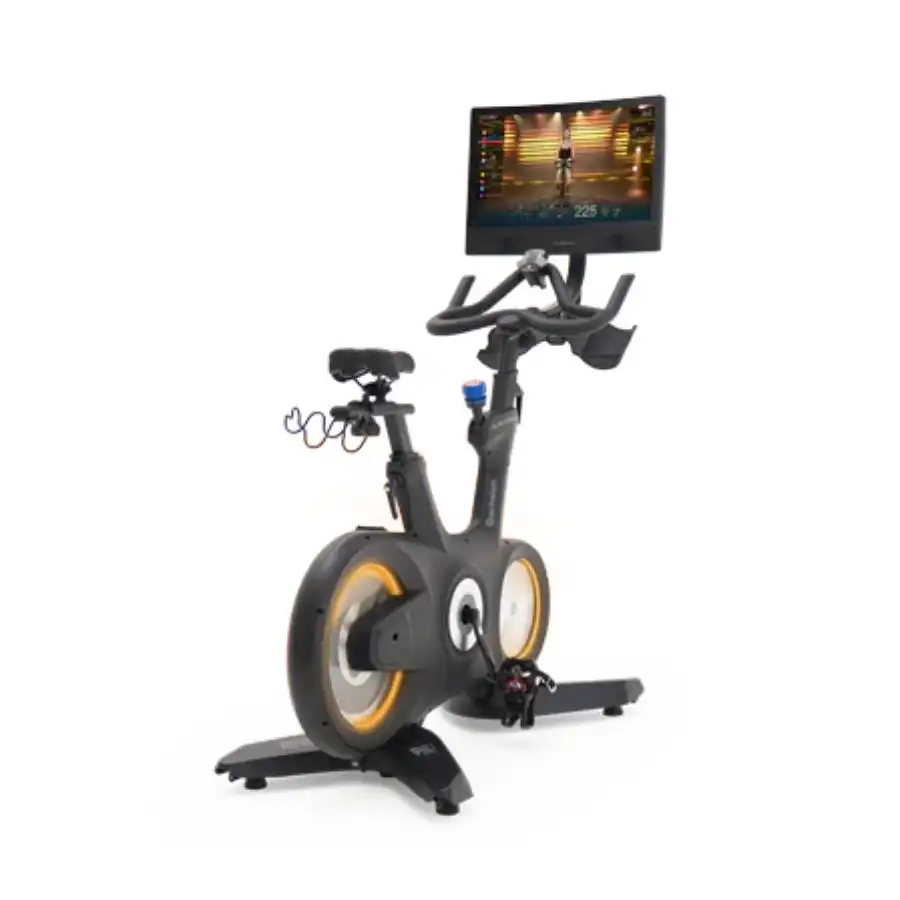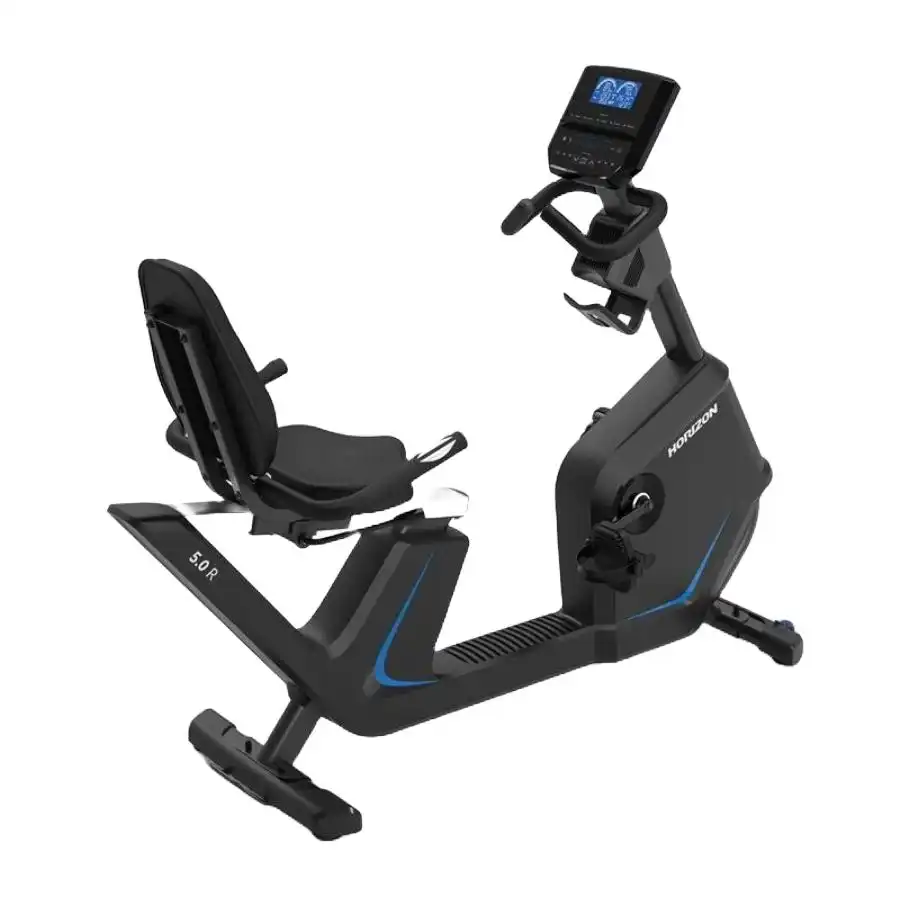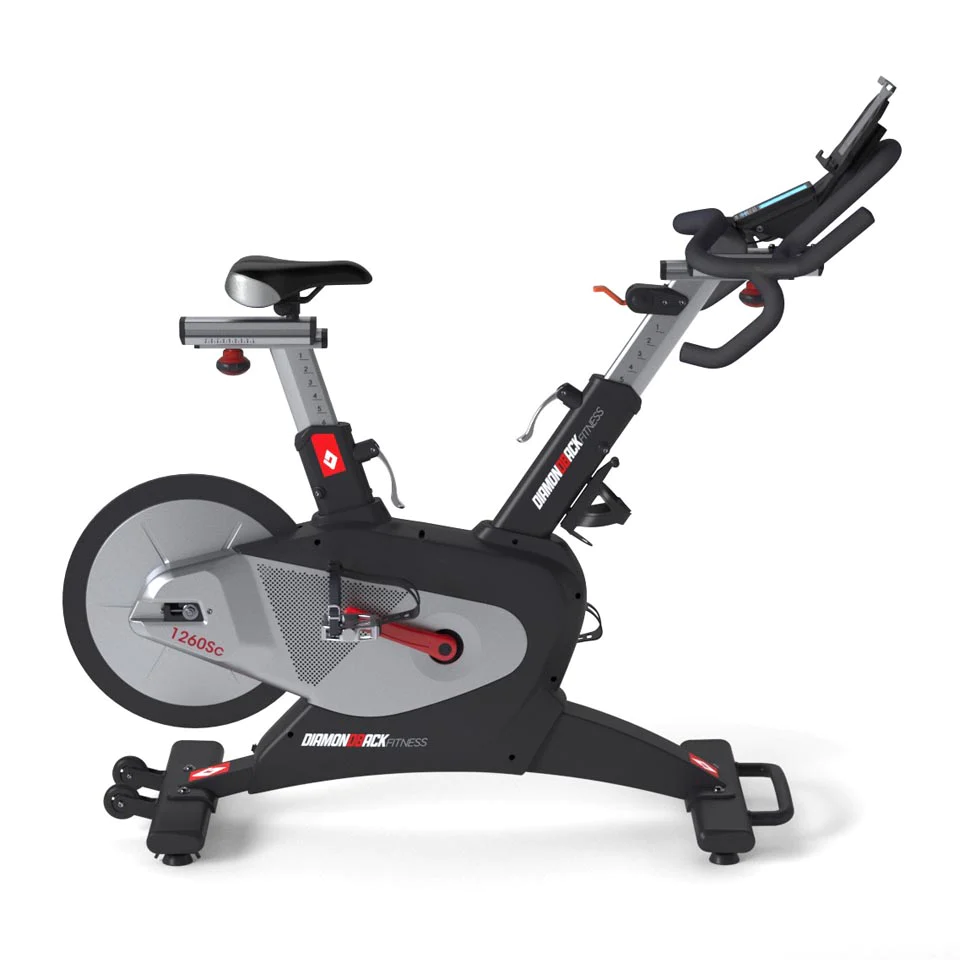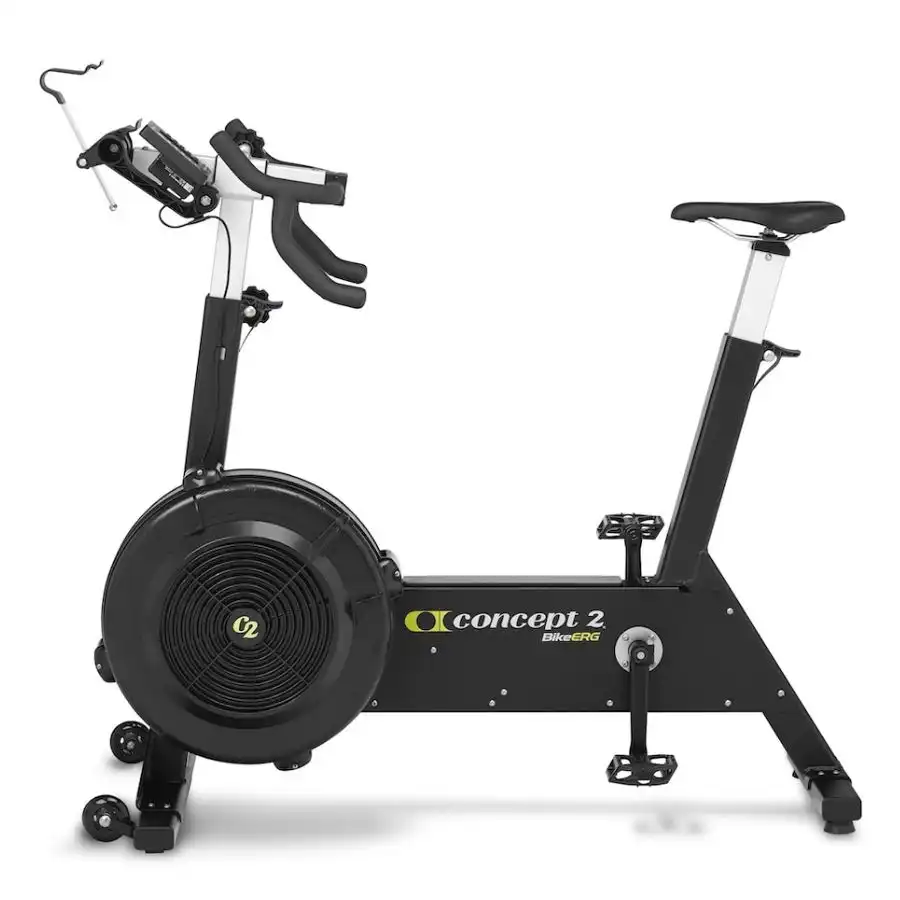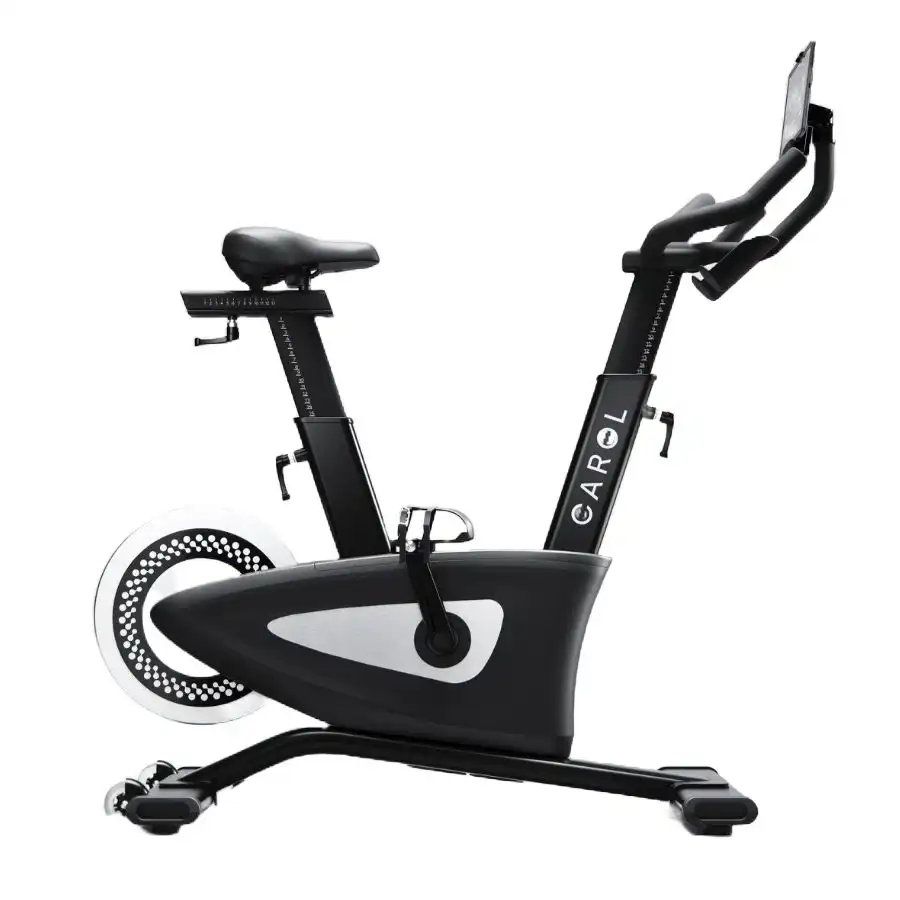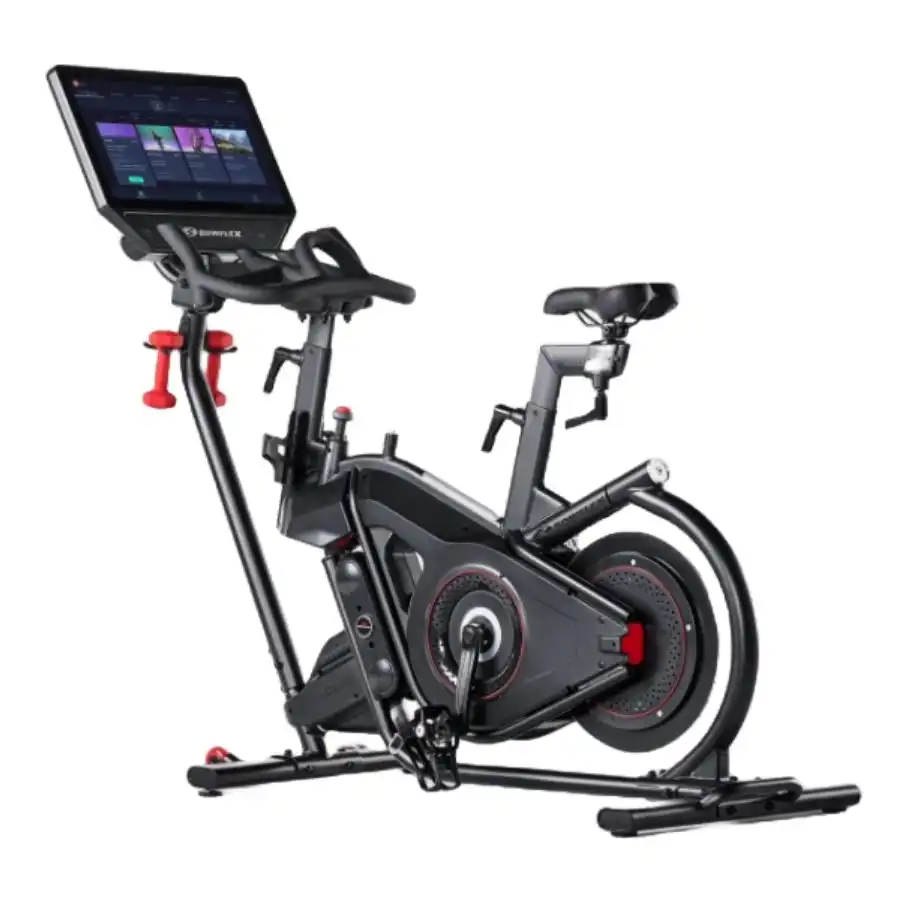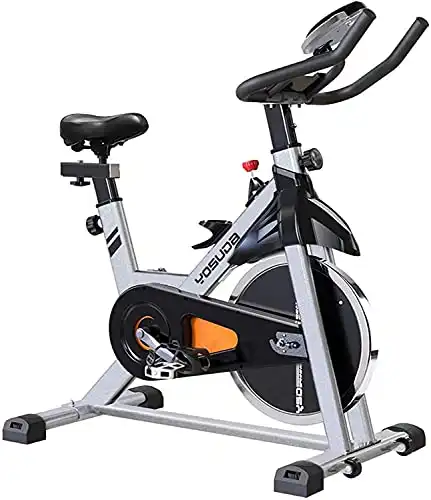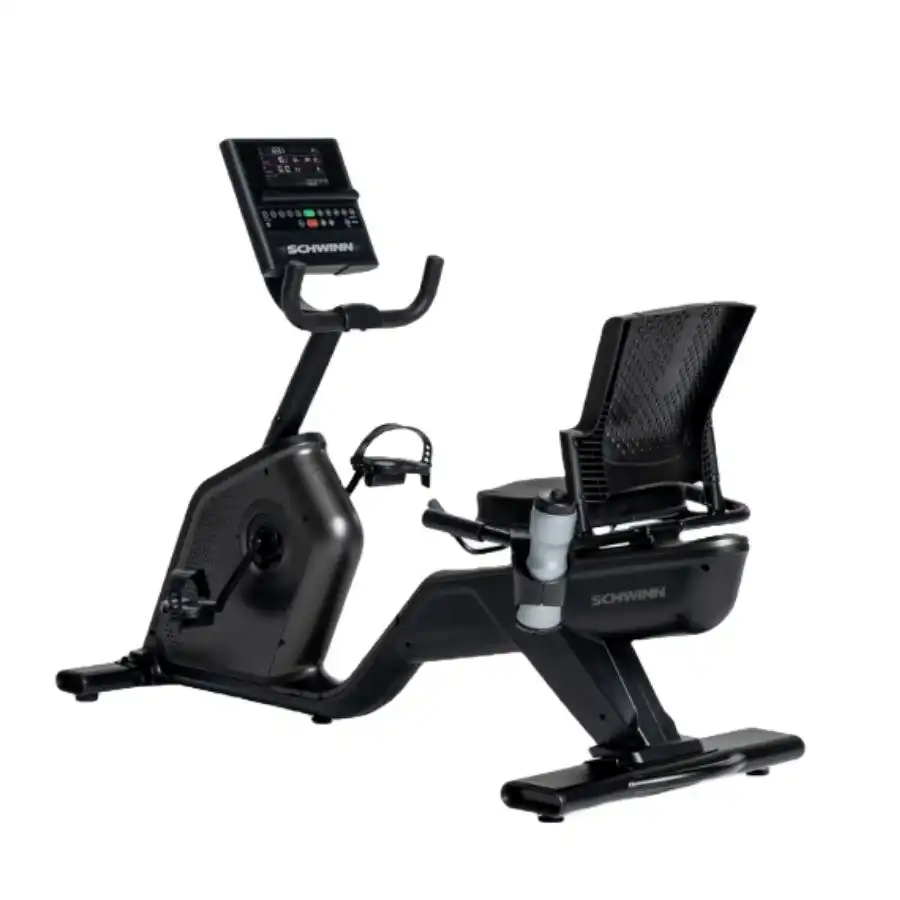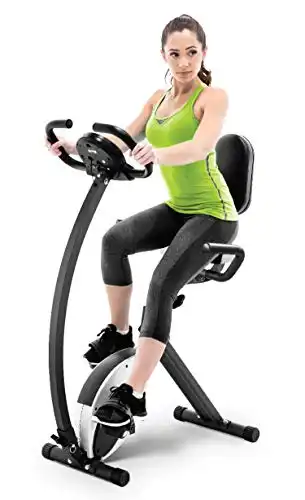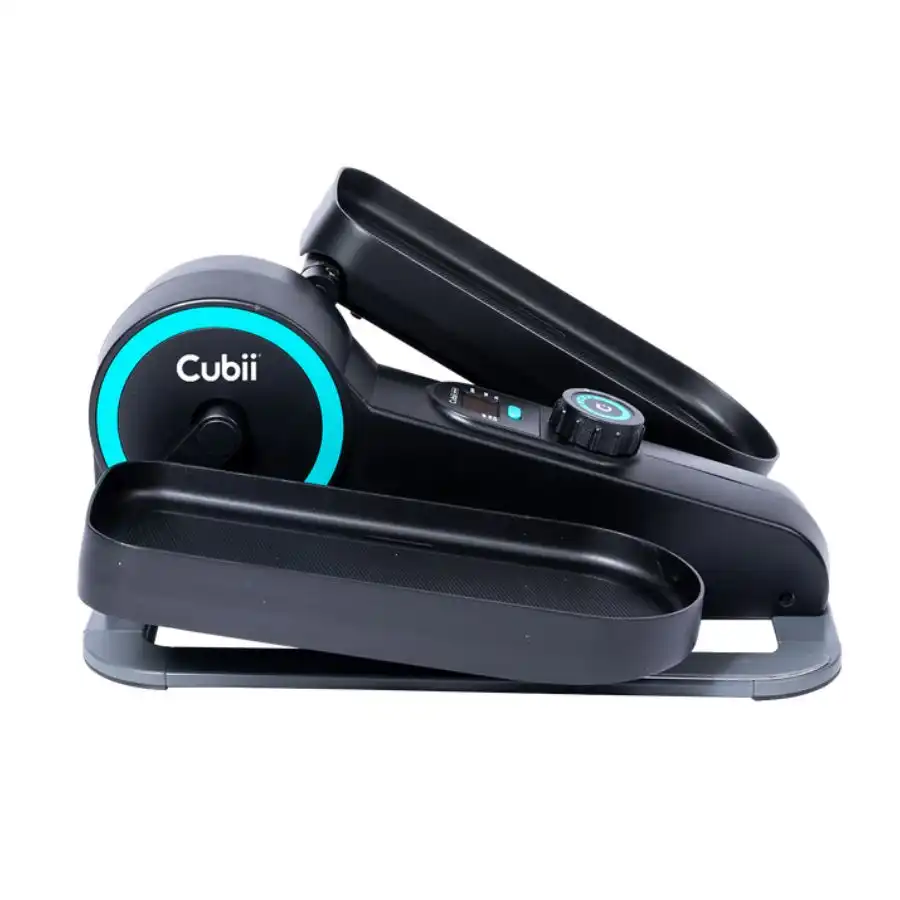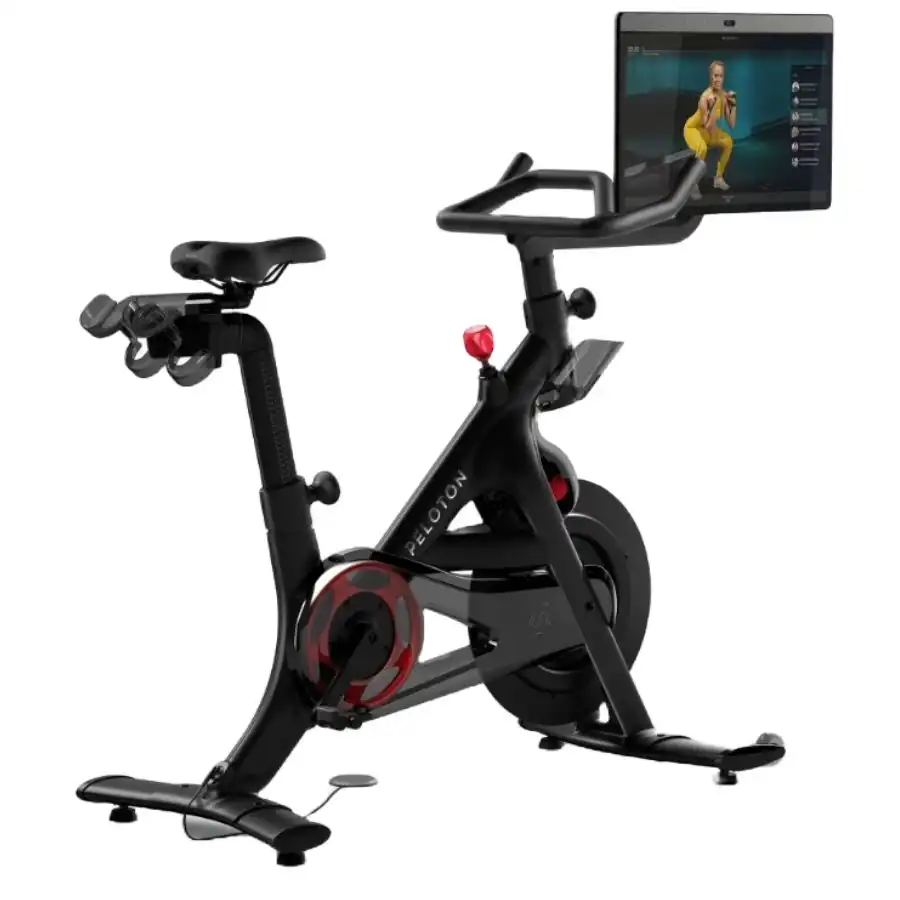Health & Fitness
13 Best Exercise Bikes of 2023, According to Fitness Experts
Out of all the cardio machines on the market, exercise bikes offer the best calorie burn in the smallest space possible. Certain bikes can work your entire body, some are low-impact, and others add a major dose of FUN to your training.
Despite packing an efficient punch, the best exercise bikes cost similar to rowing machines — as little as $300 to well over $2,500. Imagine the horror of spending thousands of dollars just to find out you don’t love your shiny new cardio equipment?!
Lucky for you, I’ve done the research for you and gathered a list of the 13 best exercise bikes, so you can pick the right one for you.
How We Chose the Best Exercise Bikes
The Breaking Muscle team comprises a passionate squad of fitness aficionados, including conditioning coaches, spin instructors, competitive triathletes, and home gym owners. Altogether, our team has tested and reviewed 50+ exercise bikes — from the cheapest to the most expensive — putting them through rigorous a 13-point protocol.
From there, we chose the best exercise bikes by category rating each from 1 to 5 based on criteria like:
- Adjustability: Are the handlebars and the seat adjustable to fit various body sizes?
- Customization: Can you swap in your own pedals, saddle, and handlebars for a more custom riding experience?
- Tech capabilities: What interactive tech is available, if any? Is there Bluetooth or ANT+ connectivity available?
We have lots to cover… so gear up and let’s dive in!
Our Top Picks for the Best Exercise Bikes
Best Exercise Bike Overall: NordicTrack S22i Studio Bike
Pros
- Excellent classes and courses with iFIT
- Smooth resistance with impressive incline/decline
- Multiple convenient accessories
- One-year iFIT membership included
- Bluetooth connectivity
Cons
- Slightly cumbersome to move
- Limited workouts without iFIT subscription
- Higher-priced exercise bike
The NordicTrack S22i is hands-down the best exercise bike overall. We had three product testers take this bike for a ride to tell us why it won our top pick.
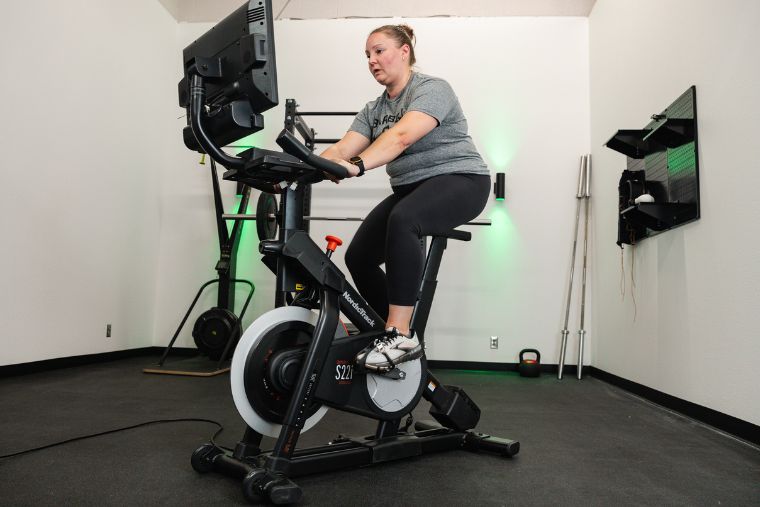
This NordicTrack bike’s programming, screen, and connectivity are excellent. Our product testers love the complimentary one-year iFIT membership because you can do live coach-led workouts, on-demand studio classes, and outdoor courses.
Plus, the 22-inch touchscreen is high-definition, so it looks like you’re riding through a trail in Hawaii or taking a spin class in person. It also swivels, so you can do other iFIT workouts off the bike without needing to see the screen from the rest of your home gym.
RELATED: Best Budget Home Gym Equipment
With 24 smooth-adjusting, magnetic resistance levels, our Breaking Muscle staff members found the riding experience on the S22i impressive.
They were pleasantly surprised that this bike inclines up to 20 percent grade and declines down to -10 percent, which is rare for a spin bike — the angle can even be auto-adjusted during your workouts by your iFIT coaches. The resistance and incline levels adjust digitally, which feels higher-end than push buttons.
NordicTrack included a series of convenient accessories on the S22i. For starters, our product testers like the dual water bottle holders and the built-in fan to keep you hydrated and comfortable during your rides. Plus, the media shelf helps hold your smartphone, and there’s even an easy-access storage tray for the two (complimentary) three-pound dumbbells.
When it comes to mobility, the S22i is more cumbersome than you’d expect. Our product testers found the front wheels helped it move, but there’s no handle at the back, so you have to awkwardly lift it from the rear stabilizer beam for the wheels to kick in. They also noticed you need to be careful with the big screen knocking into things as you reposition it. Combined with its 205-pound in-box weight, a second person can be helpful when moving the bike.
Unfortunately, the S22i’s programming is limited if you don’t have an iFIT membership. Without it, you essentially just have the machine in manual mode. There are a few free bike workouts in iFIT that you can access without the recurring subscription, but even the live chat agent couldn’t confirm this and suggested we call their Customer Service team.
With the impressive build quality and tech of this NordicTrack Studio Bike, it’s no surprise that it commands a higher price. At the time of publishing, it retails at $1,999 — making it comparable to the Peloton Bike+. Remember, you’ll also need an ongoing iFIT subscription to use the bike to its full potential. That said, I think it’s well worth the cost, considering the bike’s features and the value of the iFIT membership.
All the above considered, we rank this 4.5 out of 5 stars for its excellent classes and courses with iFIT, smooth resistance with incline/decline capability, and convenient accessories.
Best Air Bike: Assault Fitness AssaultBike Pro X
Pros
- Rugged, beefy design
- Excellent console capability
- Impressive frame and parts warranty
- Extreme calorie burn
Cons
- Repairs can be challenging
- Large and cumbersome to move
- Fan-based style is loud
The Pro X is a beast of an air bike. Our product tester loved its belt drive because it’s smoother than their more affordable Assault Bike Classic and the previous model (the Assault Bike Pro), both of which have chain drives.
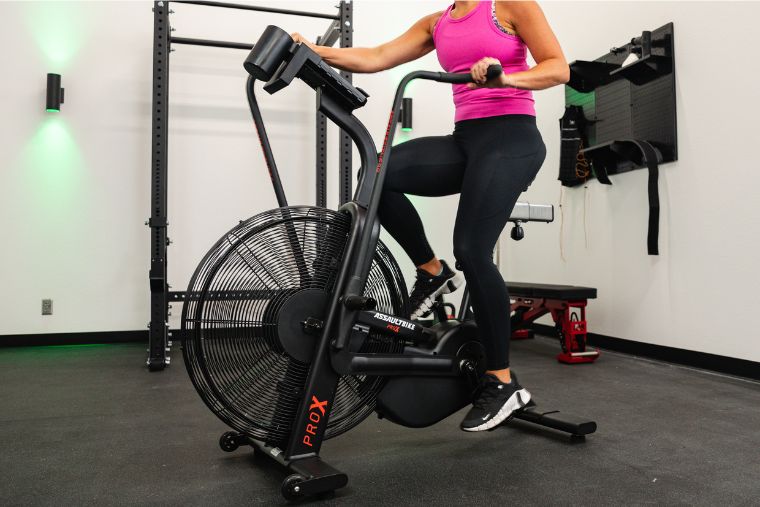
At first use, its 125-pound weight stood out, as it’s incredibly sturdy even when pedaling and pushing as hard as possible. Almost everything on this unit is metal; a full-metal construction means it’s seriously rugged and should last years, even when used by heavier and stronger athletes.
Assault Fitness uses the same “Elite” monitor on all their air bikes, and after testing 10+ air bikes, it’s become our product tester’s favorite. The physical buttons are easy to touch and colored, which is an underrated feature you’ll appreciate if you’ve done a HIIT workout on an air bike. The console’s high-contrast LCD screen also displays all the essential metrics: heart rate, calories, distance, RPM, and more. The included programming intervals and Bluetooth connectivity are a great benefit as well.
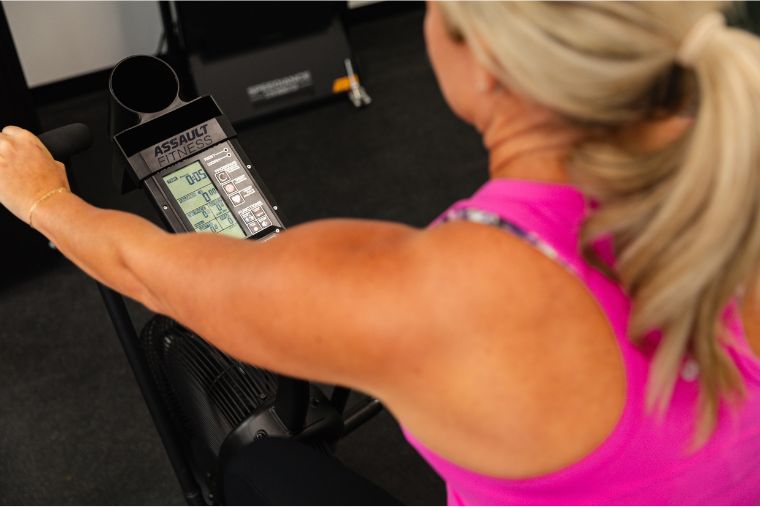
Having reviewed dozens of cardio equipment pieces over the past three years, I’m personally impressed by Assault’s warranty on their Pro X. The frame is covered by a seven-year warranty, with a three-year warranty on moving parts.
Many companies try to pass the majority of frustrating part repairs on to their customers by only covering “non-wear and tear” parts. However, Assault breaks the mold by explicitly covering “moving” parts for the first three years. Knowing you can put the Pro X through brutal workouts day after day while being covered on parts delivers serious peace of mind.
One of our Breaking Muscle staff members has extensive experience repairing air bikes and says swapping a belt or changing internal components can be a nightmare. Bike repairs often need special parts and are best done by a certified technician, so expect any significant repairs to take multiple hours, with most of your help coming from how-to/troubleshooting videos. To be fair, this applies to air bikes bought from any company — not just Assault Fitness.
Because the Pro X is large, it can be cumbersome to move. One of our product testers found the easiest way to transport it is to lift it from the rear stabilizer until the wheels contact the floor. Still, the 125-pound weight with its 52-inch x 24.5-inch footprint makes this air bike challenging to move compared to the Concept2 BikeErg, and it might be too much for some users.
In general, fan bikes might not be the best choice for home gyms that have to be careful of noise levels. As a fan-based bike, the Assault Bike Pro X is loud.
That said, the fan-blade system of the Pro X appears to be a regular bike hub with fan blades welded to it — making it much smaller than what you’d find on the Rogue Echo bike. This smaller size means less air displacement, and some Breaking Muscle team members were surprised by how quiet it was in comparison.
All the above considered, we rank this 4.4 out of 5 stars for its rugged design, excellent console capabilities, and impressive warranty.
Best Exercise Bike With Classes: Echelon EX-8s
Pros
- Amazing 24-inch HD touchscreen
- Huge class selection with Echelor Premier
- More affordable Fit Pass is also available
- Designed and engineered in the USA
- Sleek bike design
Cons
- Subscription quality is lacking
- High price for bike specs
- The one-year warranty is disappointing
One of our product testers took the Echelon Connect bike for a ride and was immediately impressed.
It features an oversized 24-inch curved touchscreen, which feels enormous but immersive when working out. Combine that with the high-definition quality and LED lights that sync to your workout metrics, and it feels like you’re cycling in a live studio class — which is super motivating. The dual-facing speakers offer great sound, and the screen flips 180 degrees, so you can easily view it for Echelon Premier workouts.
By joining their Echelon Premier Membership at $39.99 monthly, you unlock daily live classes and over 15,000 various, on-demand classes. Premier members receive exclusive discounts, a more comprehensive range of class difficulties, and up to five user profiles. With this membership, you can also view a leaderboard and compete against others, see when your friends are online, and check other users’ stats worldwide. Finally, the Echelon app syncs your console with your Strava, Zwift, Apple Health, FitBit, and Spotify profiles and data.
Alternatively, Echelon offers a more affordable “Fit Pass” at $11.99 monthly. This plan is best if you want to work out anywhere, anytime, without needing any equipment. Fit Pass includes 60+ instructors, 40+ daily live classes, challenges, and more. I like their range of workouts; they have everything from cardio and core training to meditation and barre. They even have a travel-the-world-fitness class option, which reminds our product tester of JRNY and iFIT.
Despite the massive class selection, our product tester finds the quality could be better for the monthly price, even if you sign up for a two-year plan ($29.16 monthly). She notes that the price seems high for what it is because it isn’t as produced as Peloton’s live and on-demand classes, but it isn’t bad — the production quality just isn’t quite there yet.
The EX-8S retails for $3,079.50, but it’s on sale for $1,699.99 at the time of publishing. The sale price is way more reasonable, but the original cost seems expensive for the actual specs of the bike. Considering the Peloton Bike+ is more affordable and offers a better warranty, I wouldn’t be surprised if more customers jump ship.
Echelon’s warranty on the Connect EX-8S is flat-out disappointing at just one year. Their 30-day return policy and financing option are typical, but our product tester couldn’t believe the warranty is only one year, especially for such a steep retail price. If you’re an active Echelon Premier member, you can enjoy the benefit of full warranty coverage for up to five years. However, this requires an ongoing monthly membership for 60 months, costing you a whopping $1,700 over those five years in subscription fees.
All the above considered, we rank this 3.8 out of 5 stars for the outstanding 24” HD touchscreen, along with the workout subscription options offered through Echelon Premier and the more affordable Fit Pass.
Best Exercise Bike for Seniors: Horizon 5.0R Recumbent Bike
Pros
- Mobility-friendly access
- Sturdy and stable design
- Simple and intuitive controls
- Lighter flywheel is easy on joints
- Smooth magnetic resistance
Cons
- The bike requires some assembly
- 123-pound weight might be too hard to move
- Touchscreen console requires basic tech skills
The Horizon 5.0R is excellent for seniors due to its mobility-friendly design. For example, the low, step-through frame helps you access the seated position even if you struggle with mobility or leg strength. Once you’re ready to sit down into the seat, there are front handlebars that you can hold for support as you sit down — they also make it easier to stand up after your workout.
I’m impressed by the sturdiness of the 5.0R, which is a blessing because most seniors have trouble with their balance.
The large 66-inch by 25.2-inch footprint and lower seat position result in a more stable machine. The flywheel, however, weighs just 15.4 pounds, which makes it easy to pedal at first and is gentler on your joints. That said, 100 magnetic resistance levels are available, so you can still get a smooth but seriously intense workout.
I’m also glad to see toe clips on the pedals; they help keep your feet from slipping out, which is more likely on a recumbent bike due to the reclined angle of your feet. The extra-large, adjustable seat includes a backrest and handlebars along the sides. Even though you have a near-zero chance of slipping out of the seat during your workout, holding the handlebars for extra support and peace of mind is nice.
Finally, I’m pleased with this exercise bike’s simple controls and convenient features. For one, the screen and control buttons are easy to see and reach while seated. Further, a built-in fan and an included water bottle holder keep you comfortable and hydrated during your rides. All of these features add a nice touch for older populations.
Unfortunately, the bike does require some assembly. There’s a helpful assembly video, but according to Horizon, lifting the main frame out of the box requires two people. Because of the box size, weight, and assembly, this might be too much work, depending on your strength and mobility.
Horizon does have an in-room delivery option for an extra $199 if you’re experienced with basic tools and would prefer to assemble it yourself but want the large box brought in by another person. Alternatively, they offer white glove delivery and assembly for $239, including room-of-choice delivery, complete setup and assembly, and packaging removal.
At 123 pounds, this exercise bike might be too heavy for a senior to move. There is a carrying handle at the bottom rear of the machine, and once you lift it from the handle, you can wheel it to another location. Indeed, you’re not lifting the entire bike — some of the bike’s weight will be resting on the wheels — but combined with its large footprint, you might find it unmoveable without some help.
Finally, the touchscreen console requires basic tech skills. You’ll be okay with the console if you can operate a smartphone or tablet. That said, some seniors rely only on analog (push) buttons and might find the touchscreen and controls too confusing to use if they’re not tech-savvy.
All the above considered, we rank this 4 out of 5 stars for its mobility-friendly access, sturdy and stable design, and simple yet intuitive controls.
Best Spin Exercise Bike: Diamondback 1260sc
Pros
- Spin-studio-quality bike
- Lots of adjustments to fit many riders
- The console connects to many apps
- Many convenient add-on features
Cons
- Awkwardly placed water bottle holder
- Adjusting levers is difficult
- No programming included
The Diamondback Fitness 1260sc is a fantastic spin-studio-quality bike. The rear-mounted 31-pound flywheel gives it extra smoothness, similar to riding a bike outside. Even better, Diamondback Fitness uses a belt to drive the flywheel — making it significantly smoother and quieter than a chain-driven system. Although our product tester didn’t think she’d like the magnetic resistance lever, she grew to love its premium-like clicking sound. All these finer touches make the 1260 comparable to an exercise bike from a commercial gym studio.
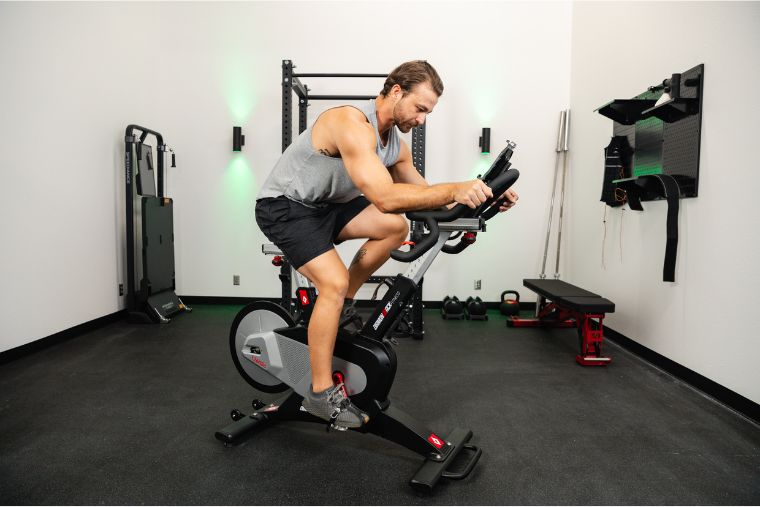
To add to the studio feel, the 1260 is highly adjustable. The handlebars are two-way adjustable (up, down, forward, and back) and have plenty of grips, so you can find a comfortable hand position whether riding in or out of the saddle. The two-sided pedals have toe clips for maximum safety and cycling efficiency, while the other is a classic flat pedal. Thanks to the two-way adjusting seat and the variety of available heights, our five-foot, four-inch tall product tester fit perfectly with a couple of inches to spare.
This Diamondback Fitness bike connects to many ANT+ apps and wearables so that you can pair it with Garmin and Wahoo products. Our product tester enjoys the vast range of apps connecting via Bluetooth FTMS (Fitness Machine Service protocol). This latest tech lets you connect your fitness equipment to popular apps like Zwift, Rouvy, Myzone, SPIVI, and others — tracking your watts, time, distance, rpm, heart rate, and more.
Our product tester doesn’t love where they put the water bottle holder and vertical adjustment levers on this bike. Since the water bottle holder is mounted in front of the post, she has to awkwardly lean forward and reach around the front post to grab water while riding. The adjustment levers also don’t open easily, so they require a lot of force to pry them open. Once opened, adjustments are no problem — but the initial sticking point of the levers is no joke.
The console on the 1260 is as simple as you can get, and it lacks any interactive features you’d see on a Peloton+. The console doesn’t provide any programming, so you must do your workouts manually, pair the console with an app, find free online classes, or join a subscription service like iFIT.
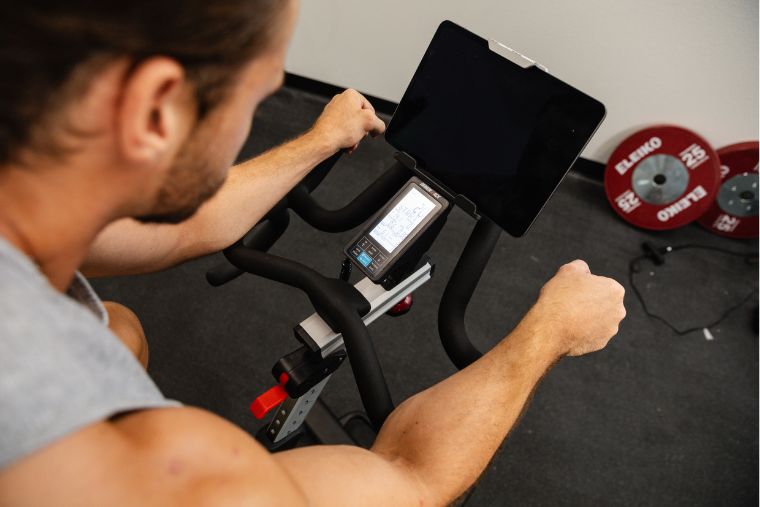
All the above considered, we rank this 3.9 out of 5 stars for its spin-studio quality, impressive adjustability, and wide range of console connectivity.
Best Portable Exercise Bike: Concept2 BikeErg
Concept2 BikeErg
3.9
- Overall dimensions: 48” L x 24” W; seat to pedal height ranges from 31″ to 40.5″
- Weight: 68 pounds
- Weight capacity: 350 pounds
- Display: PM5 monitor
Pros
- Extremely easy to move
- Highly adjustable and customizable
- Great for low and high-intensity cardio
- Quality USA-built
- Powerful monitor
Cons
- Noisy fan-based
- Lacks interactive tech
- Reasonably expensive
The BikeErg is extremely easy to move, making it the best portable exercise bike due mainly to its materials and construction. Built mostly from aluminum, it’s lightweight and compact (48 inches long by 24 inches wide), which minimizes excess weight while retaining durability. It also weighs only 68 pounds when fully assembled, making it lighter than most exercise bikes and a little over half the weight of the Horizon 5.0R Recumbent Bike.
The C2 BikeErg includes caster wheels that make moving it a breeze. Once the machine tips up for the wheels to kick in, you can roll it smoothly to wherever you want it to go. You can fit it into most vehicles by removing the seat and handlebar posts, making it easier to haul to another CrossFit box or gym.
Its high portability is heightened further by its adjustability, customizability, and versatility. The handlebars can be adjusted up, down, forward, and back. Similarly, you can raise or lower the seat and tilt it to +/-15-degrees. I’m impressed the BikeErg is compatible with most cycling parts — letting you change the saddle, handlebars, and pedals as you see fit.
One of our Breaking Muscle staff members has used the Concept2 BikeErg extensively and is continually impressed by its versatility. They enjoy it for long endurance rides and high-intensity interval training (HIIT). Unlike an air bike like the AssaultBike Pro X, the Concept2 is a jack-of-all-trades.
There are a few downsides to the Concept2 BikeErg. First, it’s rather noisy. Like the other Concept2 cardio machines, the BikeErg is also fan-based, so a loud whooshing sound is made when you pedal. Compared to a quiet electromagnetic bike like the BLANK, I could see some users being annoyed by the noise from the fan. The higher damper settings restrict airflow, reducing the loudness, but you might still need headphones or earplugs if it bothers you.
If you enjoy using interactive consoles, you might be slightly disappointed by Concept2’s Performance Monitor (PM5). It lacks the engaging and interactive aspects of the NordicTrack S22i’s iFIT membership console. The screen is small and lacks speakers. Plus, it doesn’t offer live or on-demand workout classes — you must pay for a separate subscription service.
Finally, the BikeErg isn’t cheap by any means. It’s a quality spin bike (technically fan-based, but it doesn’t count as an air bike due to the lack of moveable handlebars), so you can expect it to cost a pretty penny. You’ll save some money going with a more economical brand, but whether you’re willing to sacrifice on performance and the power of the PM5 is up to you.
All the above considered, we rank this 3.9 out of 5 stars for its easy portability, highly adjustable components, impressive customizability, and versatility.
RELATED: Concept2 RowErg Review
Best Exercise Bike for Weight Loss: CAROL Bike
CAROL Bike
4.1
- Dimensions: 45.5″ L x 22″ W
- Resistance levels: Not listed
- Available programming: Yes
- Weight capacity: 330 pounds
- Type: Spin
Pros
- AI-controlled, instant motorized resistance
- Detailed, data-driven console and tech
- Beautifully sleek design
- 100-day home trial
- App connectivity
Cons
- Requires ongoing membership for full use
- Relatively expensive at $2,595
- The one-year warranty is lacking
When you lead a busy life, keeping a regular exercise habit is easier said than done if it takes 30 minutes to an hour — enter the CAROL.
Quick note: our product testers trialed the original CAROL bike, but this review is based on the 2.0 version of the CAROL. We’ll note any updated features of the 2.0 version below.
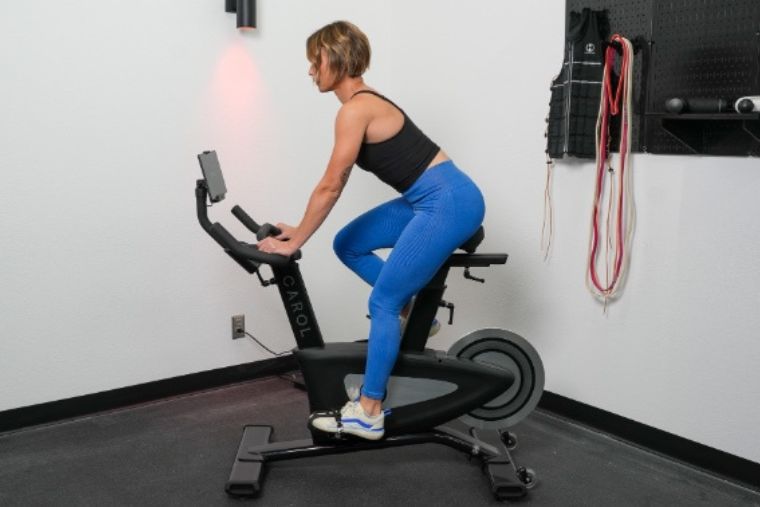
This bike is the best for weight loss because it gives you an effective workout in just five minutes, so you can easily fit it into your busy schedule. There’s no excuse with the CAROL because your workout takes just five minutes. This means you can do it any time during your day, making it much more likely that you’ll stick with your new exercise habit.
The CAROL is also ideal for weight loss because the workouts use an artificial intelligence (AI) algorithm to calculate your optimal resistance. Simply choose one of 18 different workouts and fitness tests; the upgraded console 2.0 will walk you through it without any confusion, making it suitable for any age and fitness level. You even get access for up to eight riders with the home membership, so you can help others in their quest to live healthier, too.
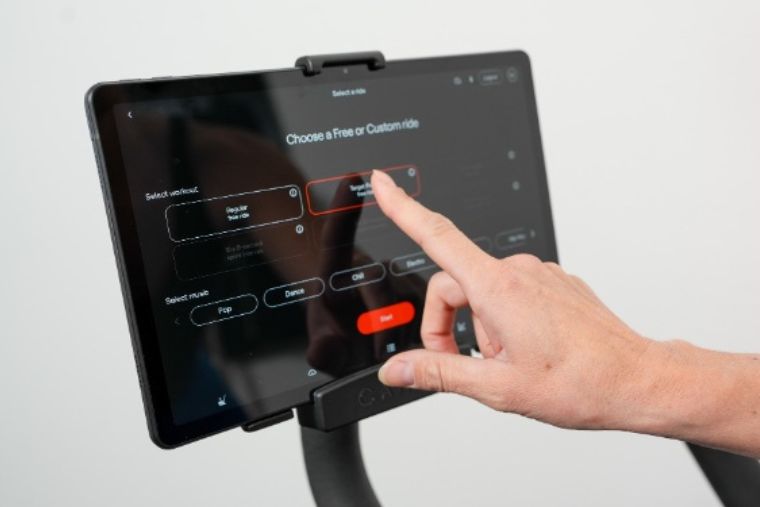
This bike also supports weight loss through data-driven results. The first model of the CAROL had heart rate monitors built into the handlebars, whereas the 2.0 model includes a chest-strap heart rate monitor to track your training. Each workout refines what it’s learned to tailor workouts to your fitness level, then shows your progress using precise data like your overall fitness score, heart rate metrics, peak power, energy output, and global and local leaderboard stats. Seeing your fitness improve with nearly every workout will entice you to return.
Unfortunately, you’re locked into paying for the ongoing $15 monthly membership if you want a fully functioning bike. Without the membership, you can still do a manual ride, but the resistance will stay at the starting resistance and never change — making it practically useless for a real workout. For this reason, changing the intensity and using the bike to its maximum potential requires a recurring membership.
Next, the CAROL is relatively expensive. Based on the bike specs alone, it doesn’t live up to the price because it costs more than the Peloton Bike+ and doesn’t include live or on-demand classes like iFIT. Further, it’s roughly ten times the price of our most affordable exercise bike, the Yosuda Indoor Cycling Bike. Remember, though, this bike isn’t made for interactive fitness classes or enjoyable rides — it’s for people who want the best results from the shortest workout possible.
Sadly, the warranty falls short based on its $2,500 price tag. Like the Echelon EX-8s, it only has a one-year warranty, leaving much to be desired. Our product tester doesn’t think you’ll have any issues with the bike breaking down. and there’s a 100-day home trial if you change your mind. Still, she wishes the warranty was much longer, and I couldn’t agree more.
All the above considered, we rank this 4.1 out of 5 stars for its AI-controlled motorized resistance, detailed and data-driven console, and beautifully sleek design.
Best Magnetic Exercise Bike: Bowflex VeloCore
BowFlex VeloCore Bike
4.2
- Dimensions: 59.8″ L x 24.1″ W x 55.3″ H
- Resistance levels: 100
- Available programming: Yes
- Weight capacity: 325 pounds
- Type: Spin
Pros
- Excellent spin bike design
- Highly adjustable
- Innovative bike-leaning feature
- Many convenient add-ons
- Two screen sizes: 16-inch and 22-inch
Cons
- Not budget-friendly
- Requires ongoing JRNY subscription
- Leaning feature may be overrated
The Bowflex VeloCore has a sleek and modern look, and our product tester was impressed with its high-quality build, finding it fun and easy to use. She appreciates the smooth-feeling 33-pound flywheel with 100 levels of magnetic resistance for quiet but intense workouts. This bike’s belt drive requires minimal maintenance and delivers a consistent performance. It has an adjustable seat, two-way adjusting handlebars, and dual-sided pedals that accommodate regular or SPD shoes — essential features for optimal comfort, especially if you’re a triathlete.
The bike comes with a choice of two screen sizes, 16-inch or 22-inch, and each is an HD, responsive touchscreen that connects to the JRNY app for live and on-demand workouts. Based on your level, an initial fitness assessment determines what classes JRNY recommends for you to try. There are also options to “explore the world” by biking around different destinations. The JRNY subscription even lets you stream entertainment like Netflix, Hulu, Prime Video, and Disney+.
The bike’s most distinctive feature is the ability to lean from side to side, creating a more dynamic and engaging riding experience. The leaning feature claims to activate muscles, burn more calories, and improve balance and coordination. The bike also has a stabilizer bar that can lock the bike in place for a more traditional ride. The leaning feature works with the JRNY app, which offers scenic rides and interactive games that challenge you to lean and steer along the route.
One downside to the VeloCore is the price, ranging from $1,799 to $2,199 based on the screen size chosen. Going off the price alone, the Diamondback 1260sc is a better choice if you’re not interested in being able to lean as part of your workouts.
The bike also requires a monthly subscription to the JRNY app, which costs $11.99 monthly or $99 per year. However, the bike’s functionality is severely limited without the subscription because you can only use the manual mode, and you can’t stream anything.
The bike’s leaning feature is the main selling point of the bike, but it may not be as beneficial or enjoyable as it sounds. It claims to activate more muscles, burn more calories, and improve balance and coordination, yet no scientific evidence on the product page supports these claims. Plus, more moving parts and sensors than a regular bike make it more prone to wear and tear. It might not be worth the extra cost and hassle for users who prefer a more stable and less gimmicky ride.
All the above considered, we rank this 4.2 out of 5 stars for its excellent spin bike design, highly adjustable components, and innovative bike-leaning feature.
RELATED: Best Jump Ropes
Best Affordable Exercise Bike: Yosuda Indoor Cycling Bike
Pros
- Affordable and highly-praised
- Excellent value for the money
- Highly adjustable like other spin bikes
- Convenient features included
- Amazon’s 90-day return policy
- One-year warranty on parts
Cons
- Limited console capability
- Accessory parts are flimsy
- Durability concerns
The YOSUDA Indoor Cycling Bike is a highly affordable exercise bike, on sale for $249.99 at the time of writing. Compared to many other bikes in this article, it’s the most budget-friendly option. Despite its economical price, I’m pleasantly surprised by its great reviews on Amazon: 4.⅘ stars based on feedback from 21,788 customers.
Our product reviewer is impressed with several features of this bike typically found on spin-studio-quality bikes. First, the flywheel is 35 pounds for a smooth riding experience that rivals cycling outdoors, and the steel frame feels heavy-duty for peace of mind while riding. The belt-driven system also minimizes noise and, combined with the mechanical (friction) resistance, is quiet enough to operate without disturbing sleeping kids or neighbors.
Like the NordicTrack S22i Studio Bike, the Yosuda also offers two-way adjustable handlebars and a four-way adjustable seat to ensure it fits as many cyclists of different sizes as possible. The built-in transportation wheels make moving it around easier, and the bike includes a device and water bottle holder.
However, the YOSUDA bike has some drawbacks that may make you think twice before buying it. The bike’s console has no programming, so you’re on your own for making or sourcing structured workouts. It also lacks Bluetooth and ANT+ connectivity, so you can’t sync it with cycling apps like Zwift or fitness devices like a heart rate monitor. Further, our Breaking Muscle team member’s LCD monitor was wobbly and seemed like it was about to fall off. It appears that Yosuda invested in some quality parts but cut corners on the rest.
For example, during testing, our product reviewer’s Yosuda had some pieces breaking off, such as the pedal strap. The bike seat was comfortable only for the first few minutes and already started to experience small tears, and the water bottle holder felt flimsy. Many reviews claim it’s a common experience for many parts to wear out or break off after a few months of use.
Finally, he provided some clear guidance on its durability. At around $300, it’s a great price but not a durable bike — it will likely need replacing in about two years. The Yosuda is fine if you’re looking for a quick short-term fix, but it’s not a forever bike.
Suppose you prefer to make your exercise bike investment once. In that case, you may want to save for a more expensive and reliable bike that offers a better value and riding experience, like the Diamondback 1260sc.
All the above considered, we rank this 3.8 out of 5 stars for its affordability, value, adjustability, and high praise on Amazon.
Best Recumbent Exercise Bike: Schwinn 290 Recumbent Bike
Pros
- Compatible with JRNY® + ZWIFT apps
- Bluetooth speakers and connectivity
- Convenient accessories included
Cons
- Pedals aren’t easy to adjust
- The step-thru area is a tripping hazard
- 90-day labor warranty is lacking
I’m pleasantly surprised with the Schwinn 290’s console and connectivity. You can use the JRNY® app on the 7″ LCD screen to access 200+ virtual courses that automatically adjust your bike’s resistance to the course’s terrain.
Alternatively, there are trainer-led classes for a workout with a more human touch. There are many workout durations and class types, so you’ll most certainly find an intensity and trainer matching your preferences. Best of all, you get a two-month free trial to JRNY® when you buy the 290 Recumbent Bike.
If you’re a ZWIFT fan, the console is compatible with that platform, so you can virtually interact, train, and compete against others worldwide. The speakers and console even have Bluetooth capability to connect to your smartphone or tablet easily. If you prefer to play your own music playlist or sync your heart rate monitor, both are possible on the 290.
While almost twice as expensive as our choice for the best affordable exercise bike (Yosuda Indoor Cycling Bike), the Schwinn 290 packs impressive features to make this an excellent value exercise bike.
The console includes a media shelf and USB charging port to rest your smartphone or tablet on within view for a hands-free workout without worrying about battery life. It also features a water bottle holder attached to the side of the backrest for easy hydration access, whether you like water or the best electrolyte powders during your rides. Due to its 107.6-pound weight, the transport wheels are super convenient for moving, especially if you plan on storing it away between workouts.
Regarding downsides, I don’t like how the foot pedals adjust. You can tighten and loosen them quickly, but you must push the selector tab into your desired strap notch to lock a size in place. Securing the tab is shockingly tricky, even more so if you have big feet or struggle with mobility.
You’re better off getting a rough estimate of the notch you need, dismounting the bike, and adjusting them with both hands. Based on my experience with these, I feel like a classic cinching strap of the Concept2 BikeErg or a plain velcro strap would be more user-friendly.
Further, the step-through area is just too cramped for my liking. It’s so small that you must angle your foot to pass it through the step-through area. As a result, I could see this being a tripping hazard for anyone with mobility or weight challenges. I’m surprised to see this area redesigned because the Schwinn 270 Recumbent — the model that the 290 has replaced — featured a much larger area for you to step through. Because of this safety oversight, I’d recommend the Horizon 5.0R over this recumbent for seniors.
Sadly, you won’t get a great labor warranty with the 290. The parts are free if anything breaks on this exercise bike within the first two years. However, the labor warranty is only 90 days — ridiculously short. This means you’ll have to figure out how to replace the part(s) yourself or pay a technician out-of-pocket to repair your bike.
All the above considered, we rank this 3.5 out of 5 stars for its JRNY® + ZWIFT apps, Bluetooth speakers and connectivity, and convenient accessories.
Best Folding Exercise Bike: Marcy Foldable Upright Exercise Bike
Pros
- Folds away to save space
- Relatively portable, if required
- Multiple surprising features
- Two-year warranty
Cons
- Console is basic
- No programming or connectivity
This foldable upright bike collapses inward to a compact 21.5-inch depth, and the backrest folds down, so the height is only 47 inches. This means it can easily be tucked away in a closet when not in use. Although it didn’t make our top choice list, a Marcy upright bike can fold. While snagging the best upright exercise bike overall spot is unlikely, the folding feature is underrated if you work out in a small space.
Marcy’s folding bike is relatively portable. It features transport wheels, making it easy to move from one corner to another without lifting and carrying the entire bike. Depending on your strength, you could carry it up or down a flight of stairs if needed because it only weighs 37 pounds — making it one of the lightest exercise bikes featured in this article.
The features of this folding exercise bike surprised me. It boasts a 250-pound weight capacity, which is great for its lightweight frame. When folded out, the 14-gauge steel feels sturdy, so I’m confident it’ll hold up to its listed weight limit. The pedals have foot straps like the Horizon 5.0R Recumbent Bike, and they’re also weighted, which makes getting your feet inserted much easier. The two-year warranty was higher than expected for a budget-friendly folding bike like this.
One downside is that the Marcy foldable bike’s console is pretty barebones, displaying only the distance, time, speed, odometer, and burned calories. It has no built-in programming, meaning you’re stuck with the manual mode and might need a subscription to vary your workout. Unsurprisingly, the console also lacks Bluetooth or ANT+ connectivity, so no apps or fitness devices will pair or sync with it. If tracking your workout data is crucial, find an alternative method or bike.
All the above considered, we rank this 3.5 out of 5 stars for its folding feature to save space, portability, and multiple surprising features like sturdiness, pedals, and warranty.
Best Exercise Bike for Small Spaces: Cubii Move
Cubii Move
3.8
- Dimensions: 21.7″ L x 19.7″ W x 9.7″ H
- Resistance levels: Eight
- Available programming: No
- Weight capacity: Not listed
- Type: Under desk
Pros
- Low impact with good metrics
- The Cubii app is free
- Small, compact footprint
- Lightweight and portable
Cons
- No programming
- Lacks intensity
- Might not work for all surfaces or desks
The Cubii Move has six adjustable resistance levels using the knob in the center of the machine, so you can customize your workout intensity and challenge yourself as you progress.
The LCD screen displays the metric you’ve selected, and this under-desk exercise bike can track a surprising number of metrics, from stride count and mileage to duration and calories burned. The reset button is large enough to press it with your toe without bending down and using your finger.
This under-desk machine is free and compatible with the Cubii app, which lets you manually add your data, join challenges, and access 300+ expert-guided workout classes. Through it, you can connect with other Cubii users and share your achievements and goals.
The Cubii is lightweight and portable, weighing only 18 pounds. Thanks to its glass-filled nylon construction, you can quickly move it from room to room. This means it’s not difficult to bring it home from your office, so you can continue to use it while watching TV after your workday — storing it under your bed or in a closet when not in use.
This under-desk elliptical isn’t suitable if you’re looking for a high-intensity or full-body workout. It only targets your lower body muscles: quads, hamstrings, glutes, and calves. However, the range of motion is significantly smaller compared to a recumbent exercise bike. It also doesn’t provide much cardiovascular or calorie-burning benefits compared to other exercise machines.
The Cubii may not work well on thick carpets as the rubber feet might sink, causing the unit to wobble and shift out of place. Also, it might not fit under some desks or chairs, depending on the height and clearance. You may need to adjust your chair or desk height to avoid hitting your knees on the underside of your desk. Lastly, you may also need to wear comfortable shoes or socks to prevent blisters or discomfort on your feet.
All the above considered, we rank this 3.5 out of 5 stars for its low impact, good metrics, free app, and portable build.
Best Exercise Bike With a Screen: Peloton Bike+
Pros
- Outstanding quality console
- High-tech screen
- Massive range of classes and music
Cons
- Premium cost of over $2,000
- Requires monthly subscription
- You won’t jive with every instructor
The screen on the Peloton Bike+ is amazing. It is a 23.8-inch HD (1080p) touchscreen that rotates 360 degrees, so you can easily switch between your cycling workouts and exercising off the bike. The screen also has a high-fidelity sound system, a front-facing camera, and a microphone so that you can interact with other riders and instructors with crystal-clear quality. The camera even has a privacy cover, which many camera-shy people can appreciate.
I like the screen’s responsiveness and how easy it is to navigate. It displays all the metrics you need to track your performance, like cadence, resistance, output, heart rate, and calories burned. It even features a reduced-reflective and anti-smudge coating, so your fingerprints won’t end up all over the touchscreen.
Peloton offers various live and on-demand classes to suit your preferences and goals. I love the availability of classes and the huge selection of music choices like pop, hip hop, rock, R&B, the 80s, 90s, 2000s, and Broadway. The classes range from five to 75 minutes, though from what I’ve seen, most classes fall in the 20- to 30-minute range. Sometimes, if I’m in the mood for a longer workout but can’t find a 45-minute class that interests me, I’ll “stack” two shorter classes together.
I particularly enjoy the Power Zone classes, where different parts focus on staying within a certain heart rate zone, and the climb or HIIT rides, where the intensity is slightly higher than regular classes. There are also many beginner classes, and even though I consider myself more advanced in fitness, I enjoy the beginner classes occasionally for active recovery.
Unfortunately, the bike is expensive. The Peloton Bike+ costs $2,495, a lot of money for an exercise bike.
You also have to pay for the accessories, such as the shoes, the mat, the weights, and the heart rate monitor, which can add up to another few hundred dollars. The bike also requires a monthly subscription of $39 to access the classes and features, another recurring cost you must factor in. If you are on a tight budget, the Peloton Bike+ might not be your best option.
The Peloton Bike+ only works with the Peloton app and the Apple Watch, which means you cannot use it with other fitness apps or devices you might already have or prefer.
For example, you can’t use the bike with Zwift, Strava, Garmin, Fitbit, or any other third-party app or device. You also can’t export your workout data to other platforms unless you use a workaround involving screenshots or third-party apps. This can be frustrating if you want to integrate your Peloton workouts with your other fitness activities or track your progress on other platforms.
It’s also important to realize that you won’t jive with every instructor. As you ride the bike more and familiarize yourself with their personalities and styles, you learn who you connect best with.
For example, I’m not a big fan of over-the-top cheerleading or motivational talk when exercising, so I avoid the instructors who tend to lean that way during their classes. Several instructors were once competitive cyclists or Ironman/triathlon athletes. They provide a lot of insight into the mindset of an athlete, which I like a lot better, so I take their classes more often. The key is to test out many instructors and stick with who you enjoy most.
All the above considered, we rank this 4.25 out of 5 stars for its outstanding quality console, high-tech screen, and massive range of classes and music.
What Are the Benefits of Exercise Bikes?
Low-Impact Training
Unlike running or jumping, cycling places less stress on your joints, bones, and muscles. This reduces injury risk and makes exercise bike training suitable for all ages and fitness levels, especially seniors and those struggling with excessive weight.
Improved Cardiovascular Conditioning
Cycling increases your heart rate and blood circulation, strengthening your heart, lungs, and blood vessels over time. This allows them to handle higher cardio demands than they could have previously tolerated. Additionally, improved cardiovascular conditioning can lower blood pressure and cholesterol, reducing the risk of heart disease and stroke.
Can Support Weight Loss Goals
Depending on the intensity and duration of your workout, you can burn anywhere from a couple hundred to nearly a thousand calories per hour on an exercise bike. This can help you create a calorie deficit essential for losing weight.
Reduced Stress
Using an exercise bike can help you reduce stress and anxiety, as it releases endorphins and serotonin, which are natural chemicals that make you feel happier and more relaxed.
Lower Body Strengthening
Exercise bikes work out your lower body muscles, such as your glutes, quads, hamstrings, and calves. This can improve your muscle strength and endurance, as well as your balance and coordination. Stronger lower body muscles can also prevent or alleviate lower back pain, knee pain, and other common ailments.
What to Consider When Buying an Exercise Bike
Exercise Bike Type
There are four exercise bike types: upright, recumbent, spin, and air.
- Upright: An upright bike allows you to sit upright with the pedals directly below you. The handles are elevated and are closer to you than on a spin bike, and the seat is usually wider and more comfortable. This conventional riding position is great if you like longer rides that focus on your legs, but it’s less effective for high-intensity training than an air bike.
- Recumbent: This style of bike has a seat with a back pad to support your middle and lower back, placing you in a reclined riding position. Unlike other styles, the pedals are at the front on a recumbent bike. The recumbent style distributes your weight evenly between the seat and the back pad, making it excellent for longer rides. Since you can relax your upper body more than an upright bike, it’s great for riders with back and joint issues. This style is also lower to the ground, so getting on and off the bike is easier — a major selling point if you struggle with mobility.
- Spin: A spin bike, also known as an indoor cycling bike, is the closest style to outdoor cycling. The narrower seat and lower bring your upper body forward, giving your upper body a workout instead of just your legs. This style is less comfortable than an upright and recumbent bike but offers better performance, which is vital for those wanting to train at higher intensities.
- Air bike: This fan-based bike style is sometimes called “dual-action.” Air bikes feature moving handlebars that you can operate separately or simultaneously with the pedals and provide resistance by the fan blades displacing air. The seat tends to be broader, and the pedals are below it, like on an upright bike. An air bike isn’t the best for long rides because it’s harder to maintain consistent resistance, but this style is unmatched for high intensity.
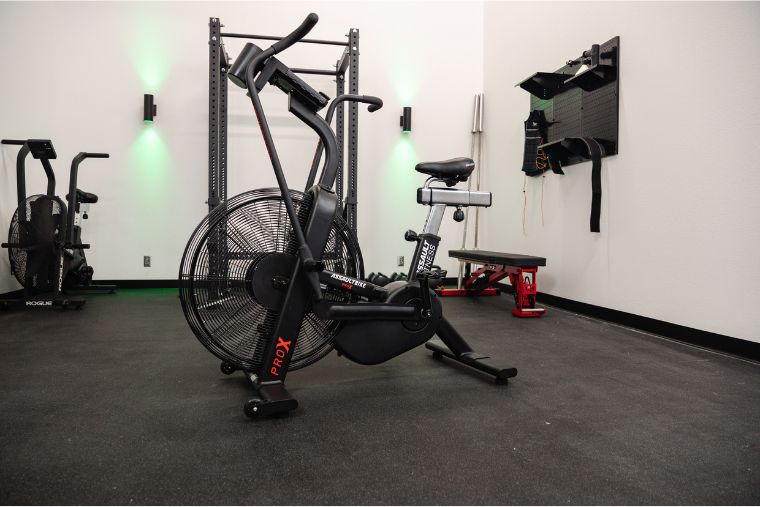
Cost
Exercise bikes can range from hundreds to a few thousand dollars. Generally, the higher-priced bikes include more features like high-tech consoles, more resistance levels, and better build quality. If you go too cheap, you can miss out on key features that prevent an enjoyable and safe cycling experience.
Dimensions
You want to ensure the bike fits comfortably in your room and doesn’t obstruct your movement or other furniture. You also want to check the weight and portability of the bike in case you need to move it around or store it away.
Remember, you’ll likely need one to two feet of open space on either side of your bike to get on and off and not feel cramped while riding.
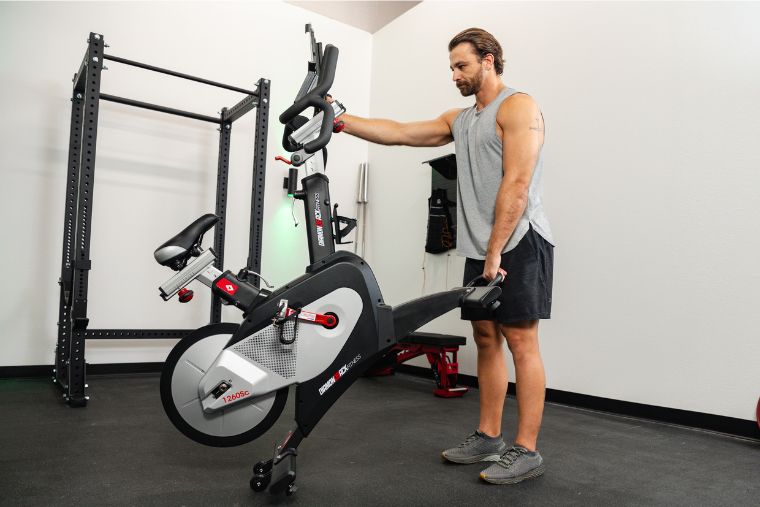
Build Quality
The overall build quality of an exercise bike should be top of mind when shopping. Look for a steel frame over aluminum — it’ll be more robust and sturdier. High-quality exercise bikes often feature a higher weight capacity, so you can usually use the bike’s total capacity as a proxy for its build quality.
Noise
If you’ll be using your exercise bike at home, you’ll want to be mindful of how noisy the bike will be, especially if you’ll be working out when kids or neighbors might be sleeping. Noise level depends mainly on the resistance type of the bike.
Air bikes are by far the loudest because they’re fan-based, followed by mechanical-tension bikes since they apply resistance using friction pads. The quietest exercise bikes will be those that use electromagnetic resistance due to magnets applying tension to the flywheel.
You’ll also want to consider whether you’ll be watching live exercise classes or follow-along workouts on your console. These will project sound with speakers, but you can usually use headphones or earbuds to minimize the noise from any tech you use.
Seat and Handlebar Adjustability
The adjustability of your seat and handlebars is paramount to avoid injury, even more so if you’re taller or shorter than average.
Typically, you’ll want a bike that lets you adjust the seat in four ways: up, down, forward, and back. Seats with upward and downward angling are also beneficial for a more customized fit. Look for two-point adjustability at a minimum for the handlebars, which means they can be adjustable forward and back.
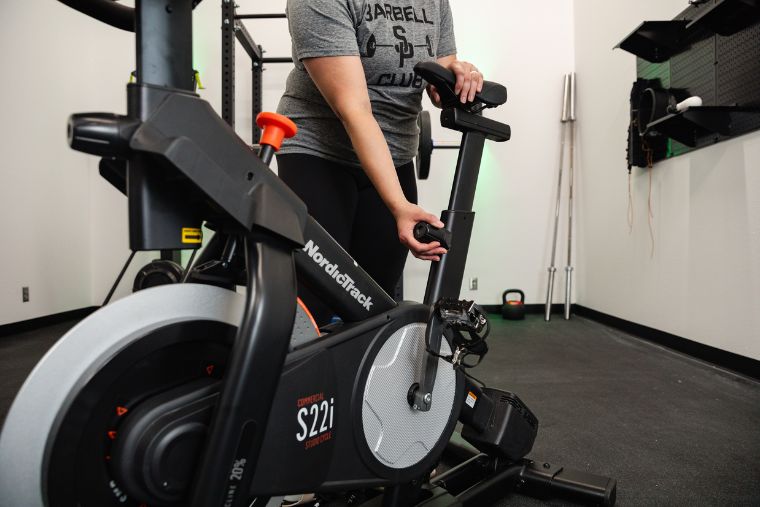
Console
Like all of the best cardio machines, exercise bikes vary widely in design, so it’s no surprise that consoles can be ultra-basic, high-tech, or even lacking altogether. Although rare, some exercise bikes don’t have a console.
The key is that not every console will show your revolutions per minute (rpm), distance traveled, heart rate, or calories burned — all of which aren’t mandatory for a workout but can be highly motivating for your long-term adherence and progress. Just remember that more detailed displays tend to come with a higher price.
Pedals
Typically, you’ll find three main types of pedals on exercise bikes: flat, cage, and clip-in.
- Flat: This is your classic type of pedal, also known as the “platform” pedal in the cycling world. Flat pedals are precisely as they sound — flat. You just put your feet against them and pedal, making them incredibly easy to use. Unfortunately, they’re harder to control on the ascent of each revolution when you’re pedaling fast, and if your feet slip, you can bang your ankles or scrape your shins against the pedals.
- Cage: This type of pedal is a flat pedal with toe clips attached to the front, which are flexible “cages” that slide over the toe box of your shoes. Toe clips hold your feet in place and make biking more efficient because you can apply force upwards without having your foot come off the pedal — allowing you to transfer that force back into the downward stroke. Since you can pull up on the pedal and push down, you can work your legs more to burn more calories.
- Clip-in: Lastly, there are clip-in pedals. Exercise bikes built for serious cyclists will tend to feature clip-in pedals connecting to cyclists’ special shoes. Not to worry though, you can upgrade the pedals of most bikes to clip-in pedals if you like the bike itself, but they only have flat or cage pedals.
Available Programming
Exercise bikes with consoles can have all kinds of built-in workouts. The most popular are hill climbing, cardio, fat burning, and strength training.
Some bikes don’t include programming, like the Diamondback 1260sc. If you’re using your smartphone or tablet, a console lacking programming might be fine. If not, make sure the bike has Bluetooth connectivity at a minimum.
Bluetooth connectivity is the most popular connectivity method, allowing you to use apps like Peloton and Zwift. AMP+ is another type of connectivity, but it’s mostly limited to heart rate monitors, so I’d recommend using Bluetooth instead. It’s a bit more money upfront but opens up the available connections for apps, workouts, and more.
Available Conveniences
Exercise bikes can come with several convenient accessories to make your workouts more comfortable and enjoyable. Not all bikes include these, but you can often buy them separately to customize your exercise bike later.
- Phone/tablet holder: If you have an exercise bike with a console lacking in streaming service and classes, then a media shelf is a convenient plus. A media shelf is just a hard plastic ridge that sticks out from the console to lay your device without it falling off. Without one, you’ll have to hold your device for the duration of your workout.
- Water bottle holder: Having a water bottle holder is seriously underrated whether you’ll be doing shorter HIIT classes or longer endurance rides. The last thing you want is to interrupt your workout just because your water bottle isn’t within reach. One of our Breaking Muscle staff members runs into this problem every workout — they have an upright bike without a water bottle holder. While it’s possible to buy the holder separately, its absence from the stock version of the bike is an annoying omission by the manufacturer.
- Built-in fans: Built-in fans are more common on the best treadmills than on exercise bikes, but some bikes, like the NordicTrack S22i Studio Bike, include them. If you sweat heavily, live in a hot or humid climate, or enjoy the added comfort of built-in airflow, it can be a convenient add-on for your bike. Remember, if your bike doesn’t include this feature, you can buy and mount a mini fan separately.
- Weight rack: Some riders like combining bike rides with weight lifting using the best dumbbells. Similar to the water bottle holder, having a small weight rack to keep them within reach will save you from getting off your bike whenever you need to use them.
- Wheels: If you’ll be moving your bike often, having wheels built into the bike is a nice feature. It means you don’t have to drag your bike and risk ruining your floor, making it easier to transport bikes over 100 pounds.
- Heart rate handles: Most bikes are compatible with heart rate monitors, but it’s even more convenient to have handles with heart rate reading capability. Unfortunately, you’ll tend only to see these on upright or recumbent bikes in the premium price range.
Resistance Types
There are three types of resistance for exercise bikes: fan-based, electromagnetic, and mechanical.
- Fan-based: An air bike is fan-based and creates resistance by the fan blades displacing air. This style offers a (theoretically) unlimited amount of resistance because the harder you pedal and push, the more air the blades will displace, causing greater resistance.
- Electromagnetic: These bikes work with magnets on either side of the flywheel. As the magnets get closer to the flywheel, they apply more resistance. Because they use magnets, these bikes are smoother, quieter, have lower maintenance, and are easier to select during workouts but more expensive.
- Mechanical: This style uses mechanical resistance in the form of friction pads made from wool or rubber. Most are designed so that you physically twist the resistance knob to add or remove the tension placed on the flywheel. Because of the friction, these bikes are noisier and often need more maintenance as pads wear out and become misaligned with heavy use — however, they are cheaper as a result.
Drive Type
When you turn the pedals on an exercise bike, the “drive” is connected to the flywheel; when that moves, you’ll feel resistance. There are two types of drives: chain and belt.
A chain-driven exercise bike will be more durable because the chain is metal, which makes maintenance cheaper in the long run. Unfortunately, it requires regular lubrication to ensure metal parts glide smoothly along each other. Also, chains are noisier than belts and feel rougher, so they’re often in fan-based and mechanical bikes.
Belt drives are quieter and smoother, so they’re usually in magnetic resistance bikes. The downside to a belt-drive bike is that the belt can loosen over time with heavy use and won’t last nearly as long as a chain — costing you more over time.
Resistance Levels
Exercise bikes have a vast range of resistance levels. Because there are also different types of resistance, there’s no universal standard or comparison method.
While knowing how many resistance levels there are on the exercise bike is helpful, the best way to see whether it offers the rate resistance range is to test it in person.
Once you have an exercise bike in mind, look for a local store where you can test it out in their showroom. Remember to bring your athletic attire and cycling shoes if you have them.
Warranties
There’s a massive range of warranties for exercise bikes, from as little as 30 days to as long as 15 years. I wouldn’t recommend settling with any less than a one-year warranty.
Based on the exercise bikes included in this article, ten years on the frame, three years on parts, and one year on labor is a solid warranty to look for if you value peace of mind from your purchase.
Weight Capacity
Weight capacity is an essential factor that affects the safety and durability of the bike because it reflects the craftsmanship and quality of the materials and parts used to build it. Choosing a bike with a higher weight capacity usually means getting a more robust frame and more durable parts like the pedals and flywheel.
Exercise bike weight capacities range from 200 pounds to over 400 pounds.
If you’re a heavier user, I’d recommend choosing a bike with a weight limit of at least 125 percent of your body weight. The closer you are to the bike’s weight capacity, the higher the risk of damaging it or injuring yourself. The bike can also become unstable, noisy, or shaky, reducing the quality of your workout.
Flywheel Weight
If you’re investing in the best exercise bike overall, flywheel weight should be one of the top things you consider. The flywheel is the heavy wheel at the front or back of the bike that spins when you pedal to create momentum. It’s linked to the pedals by a chain or a belt, similar to one in your car’s engine.
Flywheel weights can vary widely, from as little as six pounds to as much as 50 pounds. Most people will have a better biking experience with a heavier flywheel because it closely simulates riding a bike outside. I recommend looking for a flywheel between 14 and 20 kilograms (about 30 to 44 pounds). Typically, a heavier flywheel offers a smoother ride.
Suppose you’re working with a tight budget. In that case, I encourage you to sacrifice some bells and whistles like a sleek built-in tablet or a monthly class subscription because the flywheel weight is crucial for an enjoyable riding experience.
As a caveat, one Breaking Muscle staff member has used the Keiser M3i Bike extensively, with a flywheel weight of just eight pounds. It’s positioned at the bike’s rear to provide a different feel, but it can still offer an intense workout.
Final Thoughts
Exercise bikes have transformed home fitness, offering amazing exercise variety and adjustability in a small space.
The best exercise bikes combine interactive tech and powerful metric tracking without going overboard on the price.
At the end of the day, the best exercise bike for you depends on your budget, the size of your workout space, and the exercise bike features you value most.
Best Exercise Bikes: Side-by-Side Comparison
Best Exercise Bike Overall
Best
Air Bike
Best Exercise Bike With Classes
Best Exercise Bike for Seniors
Best Spin
Exercise Bike
Best Portable Exercise Bike
Best Exercise Bike for Weight Loss
Best Magnetic Exercise Bike
Best Affordable Exercise Bike
Best Recumbent Exercise Bike
Best Folding Exercise Bike
Best Exercise Bike for Small Spaces
FAQs
The best exercise bike for home use is the NordicTrack S22i Studio Bike due to its excellent iFIT classes, smooth flywheel with incline/decline capability, and convenient add-ons.
To choose a good exercise bike, consider the type of bike, flywheel weight, adjustability, display, and convenient features. You also need to compare different models based on your budget, space, fitness goals, and personal preferences.
To get a good workout on a stationary bike, you should ride for 10 to 60 minutes. The exact duration depends on your goals, your fitness level, and the intensity of your ride.
The best exercise bike cost depends on what you consider to be the “best.” The best affordable exercise bike costs about $300, whereas the best exercise bike with a screen is roughly $2,500.
The best exercises for a stationary bike are light dumbbell-based exercises because they can fit on your exercise bike’s storage tray and be within reach without you needing to get off the bike.
Source link

